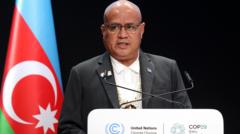The small Pacific island nation of Tuvalu has made a significant move towards modernizing its banking services by unveiling its first-ever cash machines in a ceremony deemed momentous by Prime Minister Feleti Teo. This development signifies an important milestone for the 11,000 residents on the islands, as they now gain access to electronic banking for the first time.
Five cash machines and 30 point-of-sale terminals have been installed on Funafuti, Tuvalu's main island, including a location at the airport, marking the transition from physical to electronic banking. Prime Minister Teo highlighted the historic nature of the launch, stating, "We've been in an analogue space all along; these were dreams for us." He acknowledged the financial challenge of acquiring the machines but emphasized that government support and determination made the rollout possible for the people of Tuvalu.
The installation ceremony took place at the National Bank of Tuvalu's headquarters in Vaiaku, attended by traditional leaders, members of parliament, and business officials. Previously, Tuvaluans were required to physically visit banks to withdraw money, often resulting in long queues during payroll days. The introduction of cash machines will not only alleviate this burden but will also allow local businesses to accept electronic payments for the first time.
Initially, the cash machines will only accept prepaid cards, with plans to introduce internationally usable debit and credit cards in the future. Siose Penitala Teo, the head of the national bank, stated that this transition to electronic banking represents a significant opportunity for economic empowerment in the nation.
Tuvalu, made up of nine small islands which won independence from the United Kingdom in 1978, is particularly vulnerable to the impacts of climate change, as no point on the islands rises more than 4.5 meters above sea level. Leaders in the region have been vocal about the imminent dangers posed to their existence by rising sea levels. In a speech at the COP29 Climate Conference in Azerbaijan, Prime Minister Teo warned about the potential submersion of Tuvalu in the future if global warming continues unchecked.




















